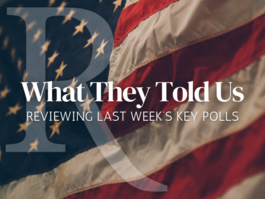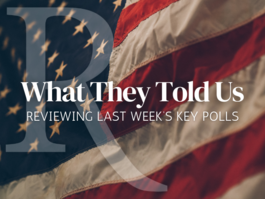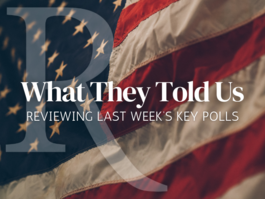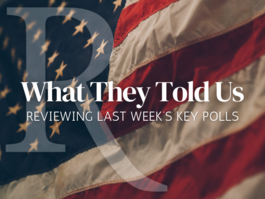Trump Change: Trump Jumps Further Ahead
“The Donald” has moved even further ahead in the latest Trump Change survey.

“The Donald” has moved even further ahead in the latest Trump Change survey.

When tracking President Obama’s job approval on a daily basis, people sometimes get so caught up in the day-to-day fluctuations that they miss the bigger picture. To look at the longer-term trends, Rasmussen Reports compiles the numbers on a full-month basis, and the results can be seen in the graphics below.

Voters remain seriously worried about illegal immigration and still think stricter border control is the best way to stop it. But slightly fewer voters believe providing a pathway to citizenship will encourage more illegal immigrants to come.
(Want a free daily e-mail update? If it's in the news, it's in our polls). Rasmussen Reports updates are also available on Twitter or Facebook.
The survey of 1,000 Likely Voters was conducted on August 27 and 30, 2015 by Rasmussen Reports. The margin of sampling error is +/- 3 percentage points with a 95% level of confidence. Field work for all Rasmussen Reports surveys is conducted by Pulse Opinion Research, LLC. See methodology.

Twenty-six percent (26%) of Likely U.S. Voters now think the country is heading in the right direction, according to a new Rasmussen Reports national telephone survey for the week ending August 27.

The election is still well over a year away, but presidential politics are already in full play.

This week, Donald Trump made headlines with a political rally in a football stadium and his televised confrontation with Univision activist/commentator Jorge Ramos. Rasmussen Reports’ latest Trump Change survey shows belief that Trump will be the next Republican presidential nominee inching up among both GOP voters and voters in general.

Voters still agree on the importance of a world-class education but also remain convinced that U.S. public schools don't provide one.

Twenty-seven percent (27%) of Likely U.S. Voters now think the country is heading in the right direction, according to a new Rasmussen Reports national telephone survey for the week ending August 20.

Voters are less satisfied with the health care they personally receive and remain pessimistic that the national health care law will make the system any better.

Trump up, Hillary down?

Billionaire businessman Donald Trump has captured the public’s attention for better or worse, and his bid for the Republican presidential nomination in 2016, once seen as a pipe dream, is now a topic of serious discussion. So for the near future at least, Rasmussen Reports intends to track Trump’s race for the White House in a weekly Friday feature we’re calling Trump Change.

In the face of increasing legal questions about the safety of secrets on the private e-mail server she used as secretary of State and of a vigorous intraparty challenge from Bernie Sanders, belief that Hillary Clinton is likely to be next year's Democratic presidential nominee has dropped noticeably over the past month.

Twenty-eight percent (28%) of Likely U.S. Voters now think the country is heading in the right direction, according to a new Rasmussen Reports national telephone survey for the week ending August 13.

It’s been a whole year since the United States first launched airstrikes against the Islamic State group (ISIS) in Iraq, but voters still think terrorists have the winning edge.

With Hillary Clinton facing increasing investigative scrutiny, are some big name Democrats poised to enter the race for the 2016 presidential nomination? Joe Biden? Al Gore?
Investigators confirmed this week that Clinton hosted top secret information on her private web server while serving as secretary of State. Most voters think Clinton’s use of a private, non-government provider for her State Department e-mail raises serious national security concerns.

Despite President Obama’s recent announcement of an even more ambitious plan to limit greenhouse gas emissions from power plants, voters still put job creation ahead of the fight against global warming and don’t blame their fellow Americans for worrying about the economy first.

Twenty-nine percent (29%) of Likely U.S. Voters now think the country is heading in the right direction, according to a new Rasmussen Reports national telephone survey for the week ending August 6.

While Democratic voters are closely divided over whether he should run for president, a sizable majority still likes Vice President Joe Biden.

The presidential season is officially open with last Thursday night’s Republican debates, and for many GOP voters, at least, it couldn’t come too soon.
Ninety percent (90%) of Republicans told us they are likely to watch some of the GOP candidate debates, and if the early numbers are any indicator, a lot of them tuned in Thursday. Republicans are planning at least 11 debates in all.

President Obama's plan to exempt up to five million illegal immigrants from deportation remains tied up in court, but most voters still don’t think the United States is aggressive enough in deporting those who are here illegally.